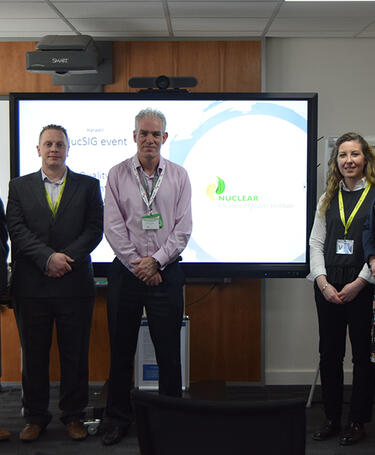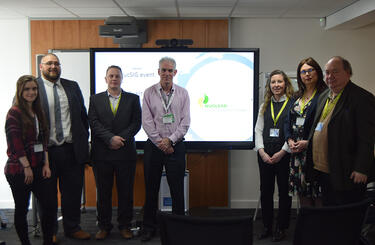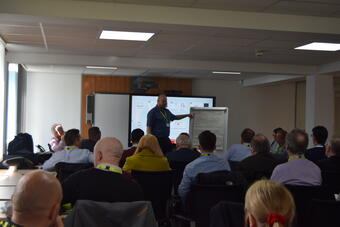
Quality for all generations in nuclear

James Brown PCQI, Quality Manager at James Fisher Nuclear Limited, and Secretary for CQI’s Nuclear Special Interest Group (NucSIG), talks to Alicia Dimas, from the CQI, about NucSIG’s event ‘The importance of Project Quality in the nuclear sector’, that took place on 27 March in Didcot, UK – and NucSIG’s new group for young quality professionals in the nuclear industry
Alicia Dimas (AD): What would you say was the take-home message from the recent event ‘The importance of project quality in the nuclear sector’?
James Brown (JB): The key message for all who attended was the reason for the event itself: the importance of project quality in the nuclear sector.
In fact, it was clear from speakers attending from other industries – including construction, oil and gas – that project quality is important to ensure assurance, governance and improvement, and that the same quality-related challenges exist in different sectors.
The NucSIG event demonstrated the importance of collaborating between sectors, SIGs and branches: to promote knowledge sharing, best practice, and to aid continual improvement.
AD: Can you briefly tell us about the new Nuclear Next Generation group (NNG)?
JB: The NNG has been set up as a part of NucSIG, with an overall aim to positively promote the quality profession and nuclear sector to all current and next generation quality professionals, and to help solve the skills gap and legacy demographic problems within the nuclear sector as a whole.
The NNG’s aim is to provide a stable foundation of support to all next generation members and facilitate networking opportunities for education and knowledge sharing, with the completion of appropriately-selected events to contribute to NNG members’ continual professional development (CPD).
The NNG objectives are as follows:
- To communicate with all levels and obtain interest within the nuclear sector and quality profession, to provide support by the use of the CQI and nuclear Competency Framework.
- To innovate and trailblaze new ideas and concepts to aid and support NucSIG, CQI and the nuclear sector as a whole.
- To establish working relationships and network with other next generation groups, to obtain and provide support for all sector industries at the next generation level.
- To arrange and communicate a series of events run by and involving members of the NNG, via the new NNG section of the NucSIG website.
- To support NucSIG as required, including the completion of allocated tasks or structured working activities and to propose related works to NucSIG for completion.
The NNG group is newly formed and progressing well, and we have set the following goals for the upcoming year:
- To obtain as much interest as possible for the group, so we can start to inspire, support and encourage the next generation of quality professionals.
- Officially launch the NNG group.
- Establish a communication strategy using all available platforms, including Twitter, Facebook and LinkedIn, etc.
- To network with other associated groups, such as the Young Nuclear Safety Professional Forum (YNSDF), the Nuclear Institute Young Generation Network (YGN) and CQI Next Generation Network (NGN), to collaborate and support the sector as a whole.
- To arrange and complete NNG events on related and applicable topics using various platforms, such as webinars, speed learning, etc.
- To provide NNG members with a system for ongoing mentoring and support.
- To support the CQI and NucSIG as a group.
As this is a new group, we will need the help of NucSIG and CQI members to actively promote the NNG within their businesses and related supply chains, and encourage potential next generation personnel to join NNG, NucSIG and the CQI, and to attend our workshops and events.
We invite everyone to look out for and share NNG communications, and to offer your opinions, views and ideas on related subjects communicated via Twitter, LinkedIn and Facebook etc. You can contact us at: [email protected].
AD: Why did NucSIG decide it was important to create this new group?
JB: Last year, the CQI provided us data showing that 63% of our members are 40 years old and over. This is also supported by data from the Global talent Index Report (GETI) in 2018 showing that 75% of personnel working within the nuclear sector were 45 years old and over, and only 1% are aged 18 to 24 years.
The 2019 statistics are not much better: almost 50% of professionals in the sector are 45 years old and over and only 7% are aged 18 to 24. The British government has advised that the nuclear sector will need around 186,000 skilled recruits each year until 2024 to overcome this skill gap and demographic crisis.
It is no secret that a mature demographic and skill shortage are a reality throughout the quality profession, and this includes the nuclear sector. That is why NucSIG is determined to provide its support to enable the profession to continue to work effectively and efficiently for many years to come.
AD: In your opinion, what are the main challenges for quality professionals working in the nuclear industry?
JB: The main challenges and focus areas for the sector for the coming year, agreed at the last NucSIG meeting, held in March, are:
- Competency/SQEP (Suitably Qualified and Experienced Person) issues
- Supply chain related risks
- Implications of Brexit on the nuclear sector.
AD: How do these challenges compare or differ to those in other industries?
JB: Most industries will have the same challenges as those identified by NucSIG, especially with the lack of employment of apprentices over the last few decades, resulting in a generation of unskilled workers. All industries have all identified this as a concern and have attempted to bridge the skills gap, and this is made more difficult by a lack of education about Quality Management in schools.
The supply chain risks are heightened in the nuclear industry due to the potential consequences of failure, which require an increased level of governance and assurance and often the suppliers require extra oversight. Any industry financed by the government is finding that major decisions are being delayed until the implications of Brexit are known, with a direct consequence on the supply chain. Like other industries, NucSIG is looking at the potential implications of Brexit.
NucSIG’s event ‘The importance of Project Quality in the nuclear sector’

Special Interest Groups

Represent your industry and gain knowledge and skills with our Special Interest Groups.


